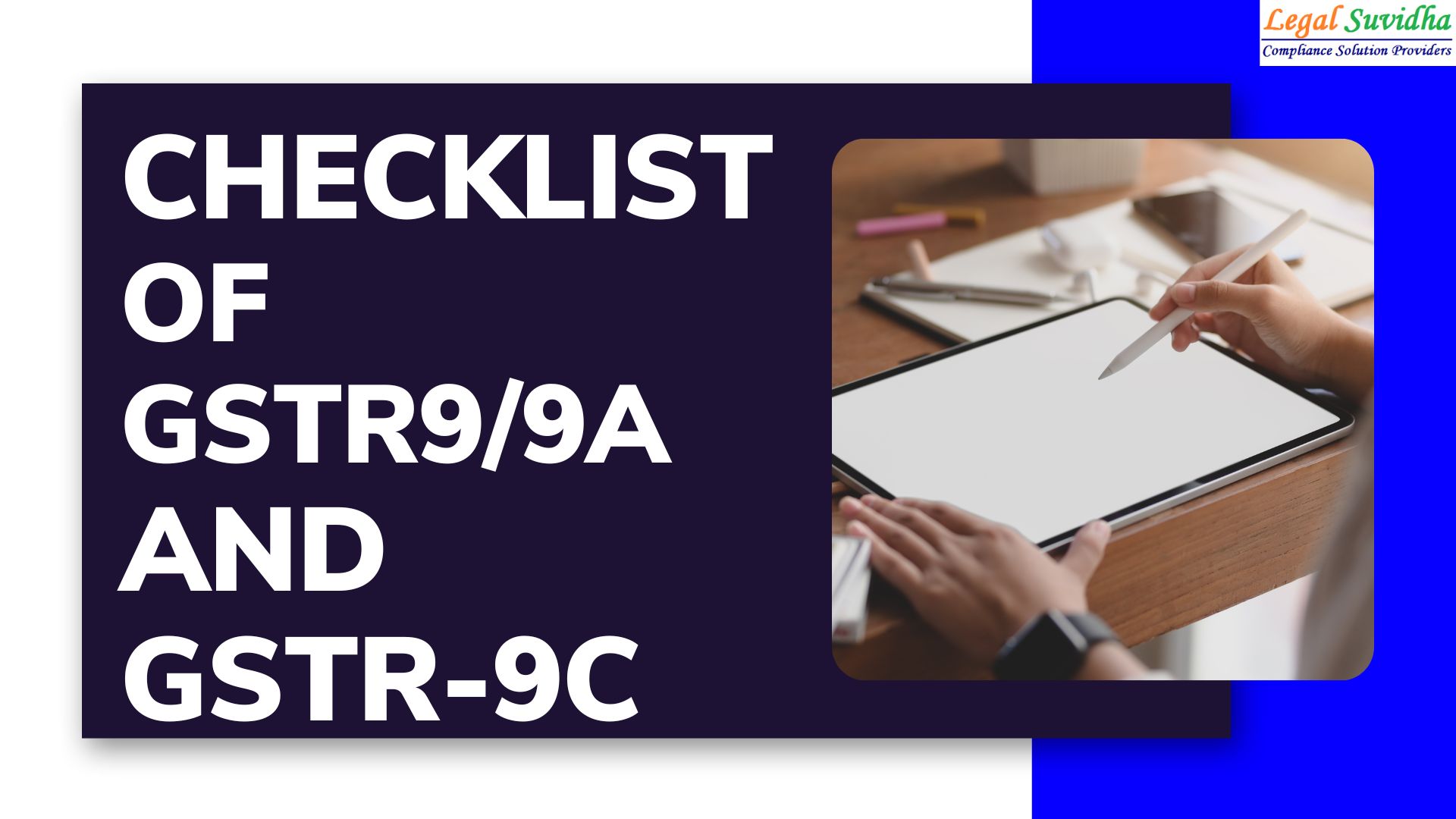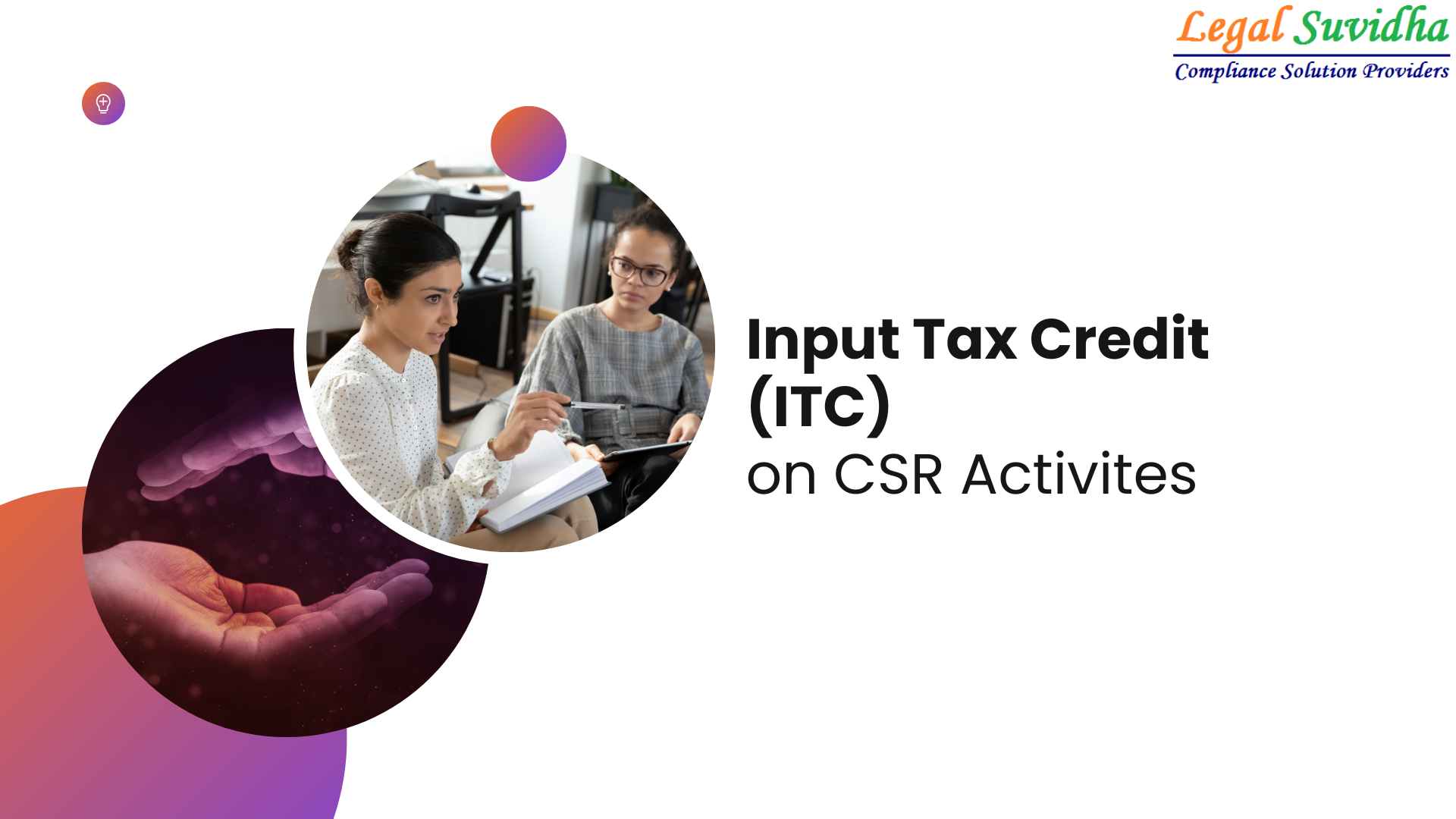CHECKLIST FOR FORMS GSTR-9/9A AND GSTR-9C
What is GSTR-9 (Annual Return)?
Informational/ a consolidation of all GSTR Returns.
What is GSTR-9C ( Reconciliation Statement)?
Analytical statement on GST returns certified by GST Auditor/ CA/CMA for GST authorities to take necessary action.
Checklist for Outward Supply:
- Taxpayers/Consultants should compare the figures of outward supplies with previous year’s figures and find out the deviation with justified reason.
- Taxpayers/Consultants should verify that invoice series issued towards outward supply of goods and services for domestic and export are in sequentially maintained. All cancelled/reversed invoices in a computerized system must be examined by taxpayer/auditor and should check whether same was reported in GSTR-1
- Taxpayers/Consultant should ensure that all classification of supplies as composite, non-composite or mixed supply was done correctly also valuation was done correctly according to section 15 of CGST Act read with respective valuation rules.
- Taxpayers/Consultant should examine that all debit notes/journals vouchers issued towards price difference on which additional GST liability payable on such additional consideration, also examined that all such debit note must reported in GSTR-1.
- Taxpayers/Consultant examine the entries in sales register on which GST was not discharged and find out reason for the same with any applicability for exemption notification or reason of non-applicability or reason of keeping out of the scope of supply (say dividend, sale of securities etc.) and in case were the benefits of cum tax valuation is taken, consultant must check if the taxes are not separately collected.
- Taxpayers/Consultant should examine the records maintained towards outward supply of goods viz. Stock and supply of goods/services under section 35 read with Rule 56 & Rule 57 for electronic records.
- Taxpayers/Consultant should examine all job work transaction undertaken during the compliance period with examine that-materials sent was returned with in stipulated time and in case goods supplied from job worker premises GST was discharged on the some and same was entered in sales register, also ensure that Job worker place was added as an additional place of business prior to supply of goods from there.
- Taxpayers/Consultant should examine the Scrap sales register and find out any unusual item sold which are in absolute nature; verify that adequate GST was discharged on the same. Taxpayers/Consultant should examine the price list, copy of agreement with customers to ascertain the mode of delivery and terms/conditions for discounts (cash, quantity, price difference). In case of post-supply discount passed on by way of issuing credit note ensure for compliance of condition for passing post supply discounts.
- Taxpayers/Consultant should also verify that any amount viz. Packing charges, freight, and any other charges recovered from the customers are been added in while determining the transaction value also ensure for correct classification composite supply/Mixed supply was made at the time of issuing Invoice.
- Taxpayers/Consultant should examine that debit note issued towards late payment interest at the time of receiving the interest instead of due based and such interest added in transaction value for discharging GST liability.
- Taxpayers/Consultant should verify the components of price added in case of free supply of goods/warrantee charges in transaction value and also ensure that any amount for which suppliers is liable to pay incurred by recipient have been added in transaction value.
- Taxpayers/Consultant should examine the delivery challan/non-returnable gate pass issued during the compliance period for goods which was not supposed to return, taxpayer should ensure that adequate GST was discharged for the same and entries was entered in sales register.
- Taxpayers/Consultant should examine the Material transfer note issued to branches within state and outside state and ensure that GST was discharged for said transaction based on transaction value under Section 15 read with Rule 28.
- Taxpayers/Consultant should ensure that correct time of supply determined under section 12 and 12(3) of CGST Act, 2017 under reverse charge mechanism.
- Taxpayers/Consultant should examine the entire supporting document on the basis of which credit note/debit note issued to customers as the credit note could be issued only the taxable value or tax charged in that tax invoice is found to exceeds the taxable value or tax payable in respect of such supply or where the goods supplied are returned by the recipient or where the goods supplied are returned by the recipient or where the goods or services or both supplied are found to be deficient as mentioned in section 34(1) and debit note could be issued only in cases where one or more tax invoice have been issued for supply of any goods or services or both and the taxable value or tax charged in that tax invoice is found to be less than the taxable value or tax payable in respect of such supply as mentioned in section 34(3).
- Taxpayers/Consultant should reconcile the turnover of GSTR-1, GSTR-3B, e-Way Bill, e-Invoice and books of account and find out reason for difference and ensure that GST was discharged correctly.
- Taxpayers/Consultant should check whether ISD/Cross charge Invoices raised to their branches in different states with compliance of prescribed provisions of GST.
- Taxpayers/Consultant should ensure that reconciliation of miscellaneous income and components of expenses where such income was netting off should reconcile with GSTR-1 and GSTR-3B outward supplies.
Checklist Inward Supply
- Taxpayers/Consultant should examine that all inward supply of raw materials, Packing Materials, Fuel, Stores and spares and services procured through purchase/Service order and from purchase order level itself registered taxable person are in position to determine the eligibility of ITC on such transaction with nature of transaction viz. composite supply, mix supply and ITC was availed with satisfying the conditions of section 16(2) of CGST Act, 2017 and Rule 36(4) of CGST Rules, 2017.
- Taxpayers/Consultants should examine that ITC was availed after receiving of Goods and services according to Section 16(2)(b).
- Taxpayers/Consultants should ensure that proper documentation for partial and full rejection of materials for inward supply and Credit note was issued by suppliers in case of such rejections are duly accounted. Taxpayers/Consultant should examine that proper system for accounting in case of materials received in short quantity and proportionate ITC was availed in such scenario. Taxpayers/Consultant should also ensure for non-availment of ITC in case of free sample received from suppliers.
- Taxpayers/Consultants should ensure that ITC availed based on eligible documents viz. Bill of entry, Tax Invoice, ISD Invoice, Self-Invoice and debit notes issued by the suppliers with supporting of Goods/Service received note.
- Taxpayers/Consultants should examine that prescribed record/electronic records under section 35 of CGST Act, 2017 read with Rule 56 and Rule 57 of CGST Rules, 2017 are maintained.
- Taxpayers/Consultants should ensure that all inward supply should be bifurcated in Input/Input Service and capital goods. Taxpayers/Consultant should ensure that ITC on all inward supply based on GSTR-2B (105%) up to December, 2021 was availed w.e.f. 01-01-2022 ITC will be based on entries reflected in GSTR-2B.
- Taxpayers/Consultant should ensure that e-way bill towards inward supply was received and maintained towards inward supply for the period of compliances, breach of the same for which department may litigate/dispute and may issue Notice for scrutiny under Form ASMT-10
- Taxpayers/Consultant should be examining the transaction of Inward supply which falls under Block credit under section 17(5) of CGST Act, 2017 and ensure that no ITC was claimed on such inward supply.
- Taxpayers/Consultants should also ensure that Inward supply for which payment towards value of Goods and GST was not made within 180 Days, ensure for reversal of ITC under Rule 37 of CGST Rules, 2017 from the date of Invoice along with Interest @18% which calculate from date of ITC taken and date of reversal of ITC.
Reports and Notices
Taxpayers/Consultant should scrutinize the following documents to evaluate the implications under GST:
Director Report
Taxpayers/Consultant should scrutinize the “Director Report” in depth to understand the overall financial results of the company, new product launched during the year, new happening and future plan of the company and change in marketing pattern etc. to understand the methodology of the company. Taxpayer should also should review the comments about internal controls system and their adequacy. This enables the taxpayer to have an idea about increasing the GST liability on value addition in case of new product launched during the year and corresponding increase in ITC availability. In case of change in marketing pattern/mode of delivery enable the taxpayer to examine the change in type of supply like composite supply/mixed supply and determination of place of supply.
Statutory Audit
Report Taxpayers/Consultant should examine the ‘Statutory Audit Report’ to fund out the qualified/adverse opinion given by statutory auditor to link theses finding with any liability arises under GST or any impact on GST liability from qualification made by statutory auditor. Statutory auditor reports that company have made adequate provision/written off/written down the value for obsolete inventory items which are currently non usable, taxpayer should examine this note in light of section 17(5)(h) of CGST Act, 2017 which provides that ITC shall liable to be reversed in case of goods lost, stolen, destroyed, written off or disposed of by way of gifts or free samples.









